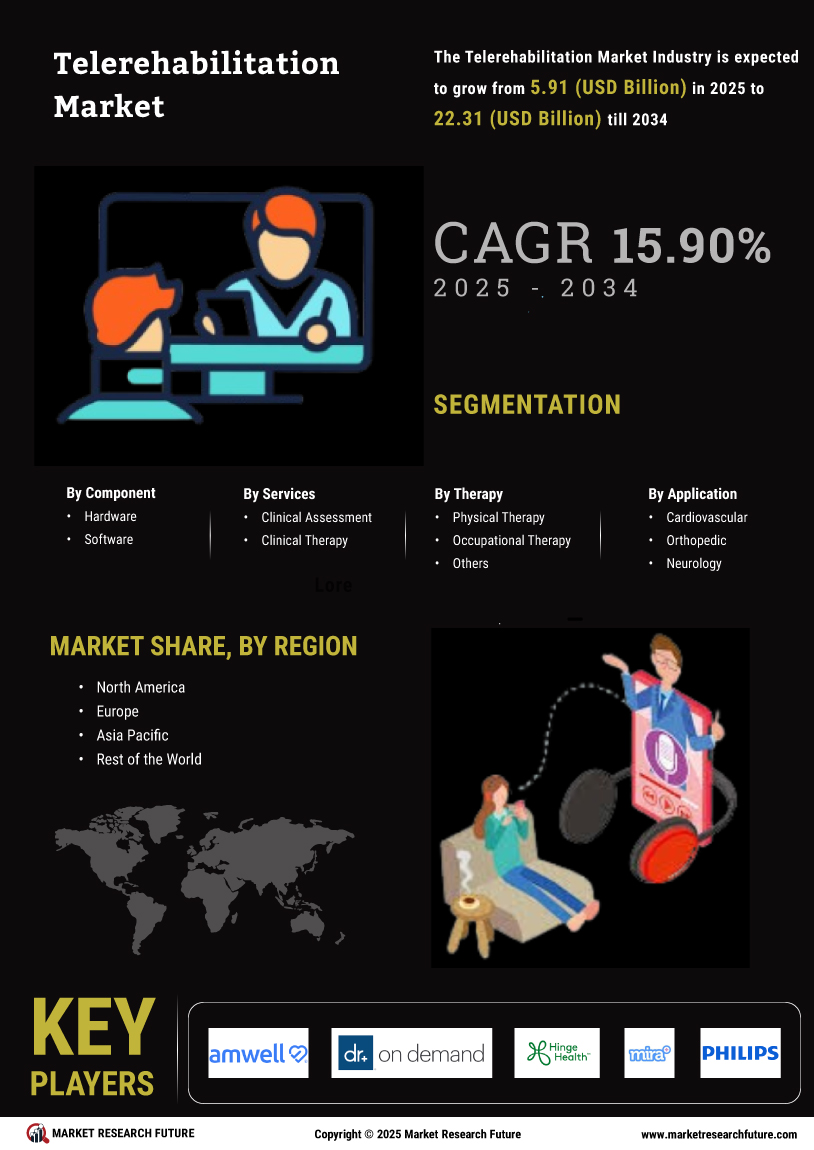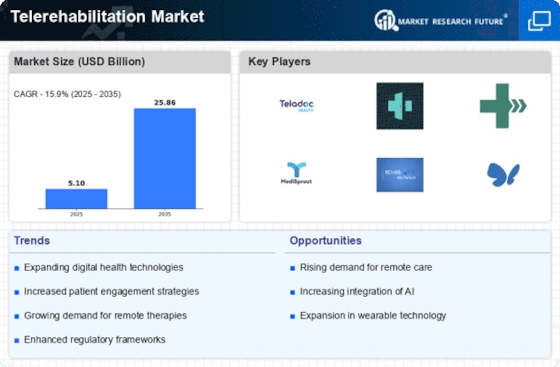Increased Focus on Cost-Effectiveness
The Telerehabilitation Market is witnessing an increased focus on cost-effectiveness as healthcare providers seek to optimize resources. Telerehabilitation offers a more economical alternative to traditional rehabilitation methods, reducing travel costs and time for both patients and providers. Studies indicate that telerehabilitation can lower overall healthcare expenses by up to 30 percent, making it an attractive option for budget-conscious patients and healthcare systems. This cost-effectiveness is particularly appealing in the context of rising healthcare expenditures, prompting a shift towards more sustainable rehabilitation solutions. As healthcare organizations strive to enhance efficiency while maintaining quality care, the emphasis on cost-effective rehabilitation options is likely to drive the growth of the Telerehabilitation Market. This trend may also encourage the adoption of telerehabilitation services among underserved populations, further expanding the market.
Growing Awareness of Rehabilitation Needs
Growing awareness of rehabilitation needs is significantly influencing the Telerehabilitation Market. As the population ages and the prevalence of chronic conditions rises, there is an increasing recognition of the importance of rehabilitation services. Patients and healthcare providers alike are becoming more informed about the benefits of timely and effective rehabilitation, which can lead to improved health outcomes. This heightened awareness is likely to drive demand for telerehabilitation services, as patients seek convenient and accessible options for their rehabilitation needs. Furthermore, educational initiatives aimed at promoting the value of rehabilitation are expected to contribute to market growth. As awareness continues to expand, the Telerehabilitation Market is poised to benefit from a larger patient base seeking innovative rehabilitation solutions.
Rising Demand for Remote Healthcare Services
The Telerehabilitation Market is experiencing a notable increase in demand for remote healthcare services. This trend is driven by a growing preference for convenience and accessibility among patients. As healthcare systems evolve, patients are seeking alternatives to traditional in-person visits, particularly for rehabilitation services. According to recent data, the telehealth market is projected to reach a valuation of approximately 250 billion dollars by 2027, indicating a robust growth trajectory. This shift towards remote care is likely to enhance the adoption of telerehabilitation services, as patients recognize the benefits of receiving care from the comfort of their homes. Furthermore, the integration of telehealth into standard practice is expected to streamline rehabilitation processes, making them more efficient and patient-centered. Consequently, the rising demand for remote healthcare services is a significant driver of growth within the Telerehabilitation Market.
Regulatory Support for Telehealth Initiatives
Regulatory support for telehealth initiatives is emerging as a crucial driver for the Telerehabilitation Market. Governments and regulatory bodies are increasingly recognizing the value of telehealth in enhancing healthcare access and quality. Recent policy changes have facilitated the reimbursement of telerehabilitation services, encouraging healthcare providers to adopt these innovative solutions. This regulatory backing is likely to foster a more favorable environment for the growth of the telerehabilitation sector. As policies evolve to support telehealth, the market is expected to expand, with more providers offering telerehabilitation services as part of their care continuum. The alignment of regulatory frameworks with the needs of patients and providers may further enhance the credibility and acceptance of telerehabilitation, solidifying its role in the broader healthcare landscape.
Technological Advancements in Communication Tools
Technological advancements in communication tools are playing a pivotal role in shaping the Telerehabilitation Market. Innovations in video conferencing, mobile applications, and wearable devices are enhancing the delivery of rehabilitation services. These tools facilitate real-time interaction between healthcare providers and patients, allowing for personalized treatment plans and continuous monitoring of progress. The market for telecommunication technologies is anticipated to grow substantially, with estimates suggesting a compound annual growth rate of over 15 percent in the coming years. This growth is likely to bolster the capabilities of telerehabilitation platforms, making them more user-friendly and effective. As technology continues to evolve, the potential for improved patient engagement and adherence to rehabilitation protocols increases, thereby driving the expansion of the Telerehabilitation Market.

















Leave a Comment